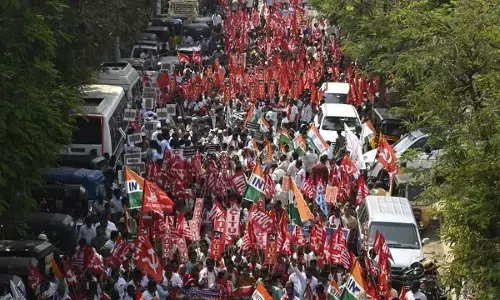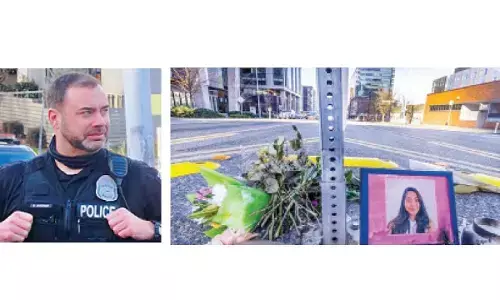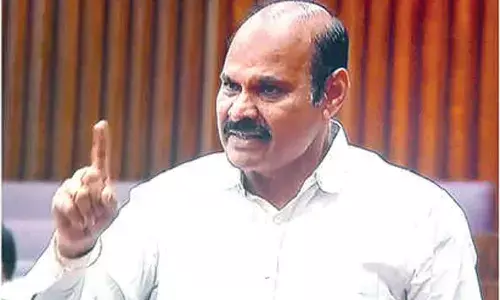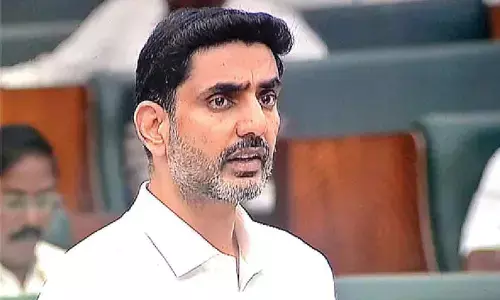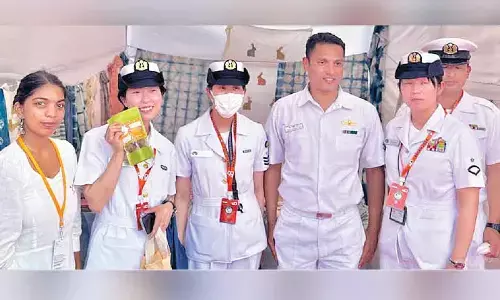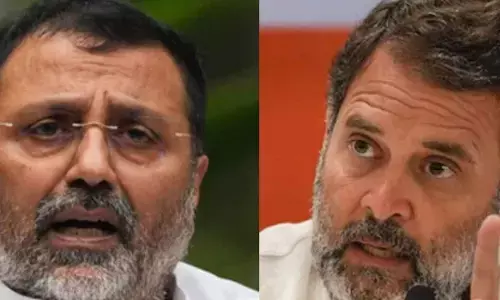Enforce absolute liability on LG Polymers
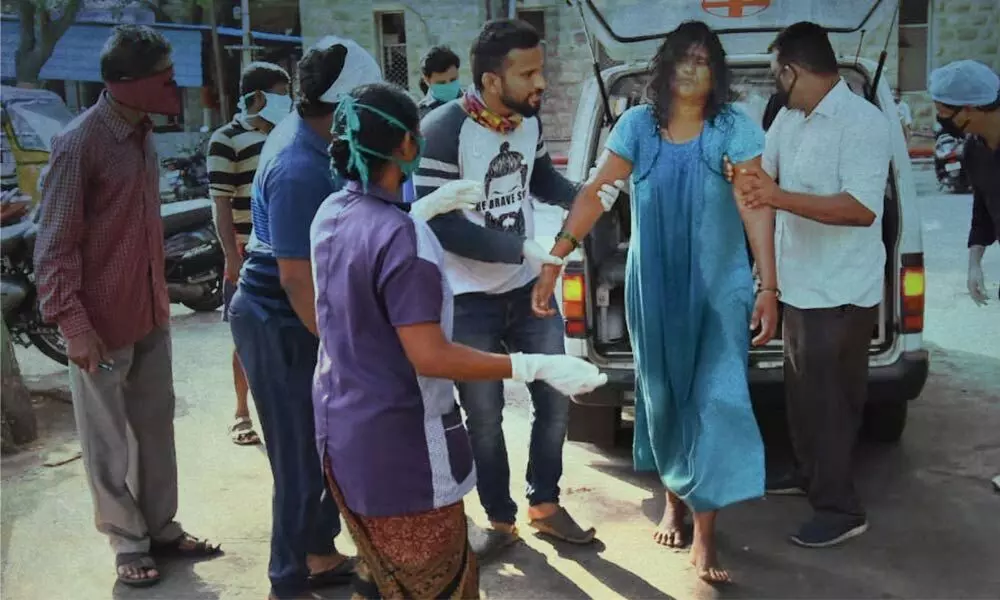 Representational picture
Representational pictureThe Andhra Pradesh government must enforce absolute liability principle to get maximum compensation to the victims and also prosecute the culprits for culpable homicide not amounting to murder under first part of Section 304 Indian Penal Code which enables the courts to punish to the extent of imprisonment for a term of 10 years.
The Andhra Pradesh government must enforce absolute liability principle to get maximum compensation to the victims and also prosecute the culprits for culpable homicide not amounting to murder under first part of Section 304 Indian Penal Code which enables the courts to punish to the extent of imprisonment for a term of 10 years.
As Visakhapatnam woke up in the morning on Thursday, May 7, death was dancing in its streets. It was like mini-Bhopal with children, women and men lying across the streets and roads, some running across the roads and canals and some falling them in. It recalled the tragedy of Bhopal gas leak that killed all the passengers of a train that passed by the side of the UCIL factory.
After killing and injuring over 1,200 besides affecting the life in four-kilometre radius, leaked LG chemical threw away the people into sewers and canals while running away from haunting gas.
It is the duty of such factories who deal with poisonous gases to give due publicity to required measures to counter the leaked gases. There should be an advance warning system of the leak, and if a leak occurs immediate addressing of the public through Public Address System to advise them how to escape.
If pesticide Sevin manufactured with chemical of MIC by UCIL (Union Carbide) was the cause of mayhem in 1982, it is Styrene Monomer now. As per the criminal complaint, in early hours of May 7, at around 3.30 am gas emanated from LG Polymers India in Gopalapatnam, endangering life around that area, killing 11 and making thousands flee with fear into fields, roads etc in search of safety. The leaked poisonous gas also affected the animal and plant life. Hundreds well unconscious. The managers of the LG Polymers were charged under IPC Sections 278, making atmosphere noxious to health, 284 negligent conduct with respect to poisonous substance, 285, negligent conduct with respect to fire and combustible matter, 337, causing hurt by rash and negligent act endangering human life, and 388, extortion by threat of accusation of an offence punishable with death or imprisonment for life. They should examine why a criminal case is not booked under first part of Section 304 for culpable homicide not amounting to murder. It says: "Whoever commits culpable homicide not amounting to murder shall be punished with imprisonment for life, or imprisonment of either description for a term which may extend to ten years and shall also be liable to fine".
The company has five directors, namely Poorna Chandra Mohan Rao Pitchuka, Chan Sik Chung, Hyun Seok Jang, Sunkey Jeong, Byungkeun Song and one key management personnel, Ravinder Reddy Surukanti. Pitchuka was replaced by Sunkey Jeong later. One of the directors, Hyun Seok Jang, is also the director of three other companies, LG Chemical India Private Limited (New Delhi), LGC Petrochemical India Private Limited (Mumbai) and LG Chem Life Sciences India Private Limited (New Delhi).
The AP government has to disclose all the documents collected by AP Pollution Control Board and explain whether required conditions were fulfilled by LG Polymers for securing in January 2018, environmental clearance from PCB for expanding producing 415 to 655 tonnes of polystyrene and expandable polystyrene per day using hazardous chemicals, at additional cost of Rs 168 crore, which is valid up to December 2021. How could the company get this clearance when it did not obtain clearance for petrochemical based processing as per schedule to Environment Impact Assessment Notification 2006. It is the duty of the AP government to clarify how it was convinced that this was an essential industry to permit functioning even during the lockdown days.
Whether the factories' inspector has examined the conditions of this factory before permitting it to establish and expand? Whether the LG Polymers had informed the government about the possibility of leakage or danger waiting to harm the human, plant and animal life around the factory premises? What is its crisis management plan? Was that notified?
Time has come to implement the principle of 'absolute liability' laid down by the Supreme Court after the Bhopal gas tragedy and codified by Parliament in the form of 'Public Liability Insurance Act, 1991', under which the victims are entitled to immediate compensation of Rs 25,000 even without raising questions of proof of liability of culprits in the factory management.
The leaked methyl isocyanate (MIC) gas killed 3,800 immediately in Bhopal during the night of December 2-3, 1984. Also killed thousands of trees and animals around. Tens of thousands injured who later died slowly. It was called Bhoposhima that caused genocide. No value for human life. The big businessmen care two hoots for human lives. We hang killers in street as cruel murderers, and none is punished for Bhoposhima genocide.
In June 2010, seven former employees of UCIL, septuagenarian Indian nationals were convicted of causing death by negligence: Keshub Mahindra, former non-executive chairman of Union Carbide India Limited; V P Gokhale, Managing Director; Kishore Kamdar, Vice-President; J Mukund, Works Manager; S P Chowdhury, Production Manager; K V Shetty, Plant Superintendent; and S I Qureshi, Production Assistant. Each of them was sentenced to two years' imprisonment and fined Rs 1,00,000 (equivalent to Rs 1,80,000 or US$2,500 in 2019). All were released on bail shortly after the verdict.
In Oleum gas leak case, a PIL by MC Mehta (AIR 1987 SC 1086), the Supreme Court laid down the principle of absolute liability: "where an enterprise is engaged in a hazardous or inherently dangerous activity and harm results to anyone on account of an accident in the operation of such hazardous or inherently dangerous activity resulting, for example, in escape of toxic gas the enterprise is strictly and absolutely liable to compensate all those who are affected by the accident and such liability is not subject to any of the exceptions which operate vis-à-vis the tortious principle of strict liability under the rule in Rylands v. Fletcher, an English case of 1868. The absolute liability is strict liability without any exception.
Justice PN Bhagwati said in this case: "…. an enterprise, which is engaged in hazardous or inherently dangerous industry which poses a potential threat to the health and safety of the persons working in the factory and residing in the surrounding areas owes an absolute and non-delegable duty to the community to ensure that no harm results to anyone on account of hazardous or inherently dangerous activity which it has undertaken.
Another major rule laid down was that the measure of compensation in the kind of cases referred to must be correlated to the magnitude and capacity of the enterprise because such compensation must have a deterrent effect. The large and more prosperous the enterprise, greater must be the amount of compensation.
Environment Protection Act (EPA), was made in 1986. In 1987 a new chapter was added to the Factories Act, 1948. The word 'occupier' was redefined to include of the director of the company which implies a responsibility for the affairs of the factory including the safety. Another major change is that 'Hazard' and 'disaster' were now extended to people living nearby and not just on the factory premises. The amended Factories Act now states it is the occupier's obligation to show, in the event of an accident, that due diligence had been exercised to enforce the safety obligations.
In 1991, the Public Liability Insurance Act (PLIA) was brought into force to provide interim compensation to the victims in the event of an industrial disaster without having to prove neglect or wrongful act of any person. PLIA requires industry owners to obtain insurance policies which shall not be less than the paid-up capital of the unit and limited to Rs 50 crore. This was amended in 1992 because insurance companies were unwilling to insure hazardous companies for a sum without a cap on compensation per victim. "This, even though the PLIA prescribed limits on the amounts to be paid to each affected person where death, serious injury, loss of work, or damage to property occurs."
The PLIA also facilitates institution of an Environmental Relief Fund (ERF) to receive the premium a factory owner paid on his insurance policies. Though Pollution Control Boards and Green Tribunal are put in place, there are apprehension of mini-Bhopals because among many laws, the storage rules or even hazardous waste rules are not being followed.
(The writer is former Central Information Commissioner and Professor at Bennett University)


